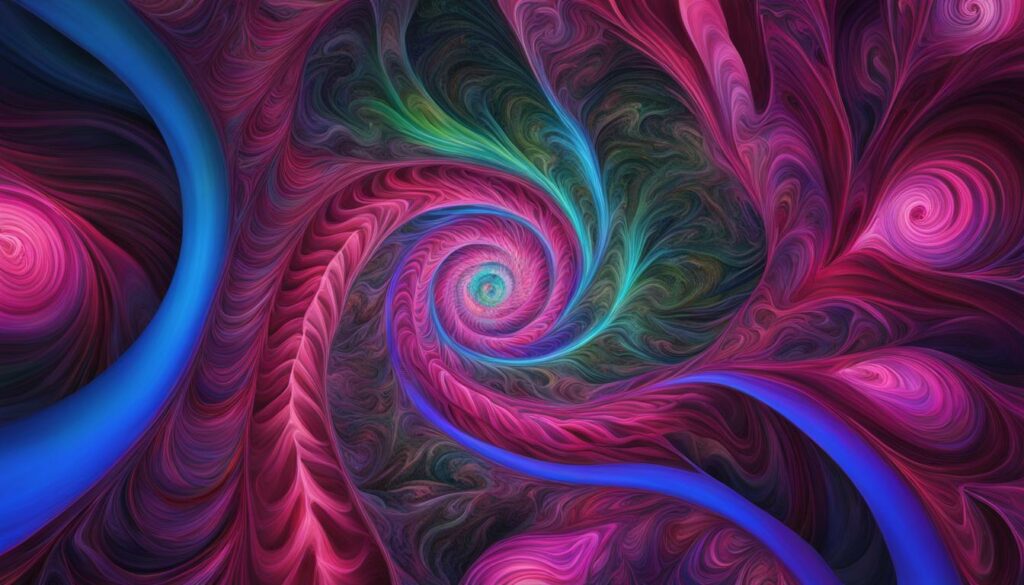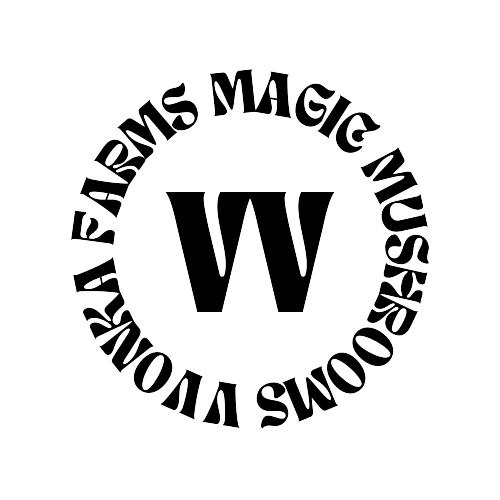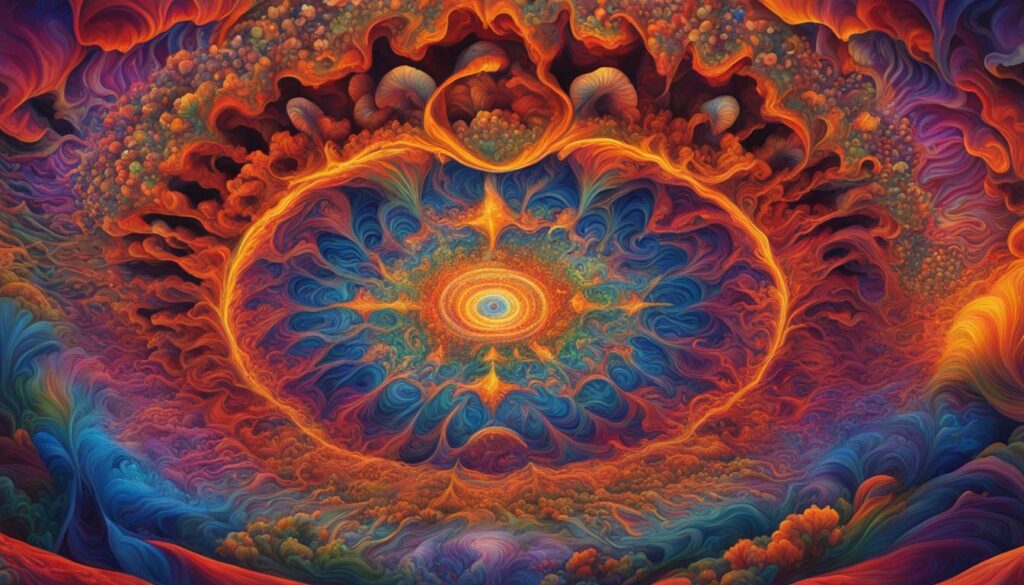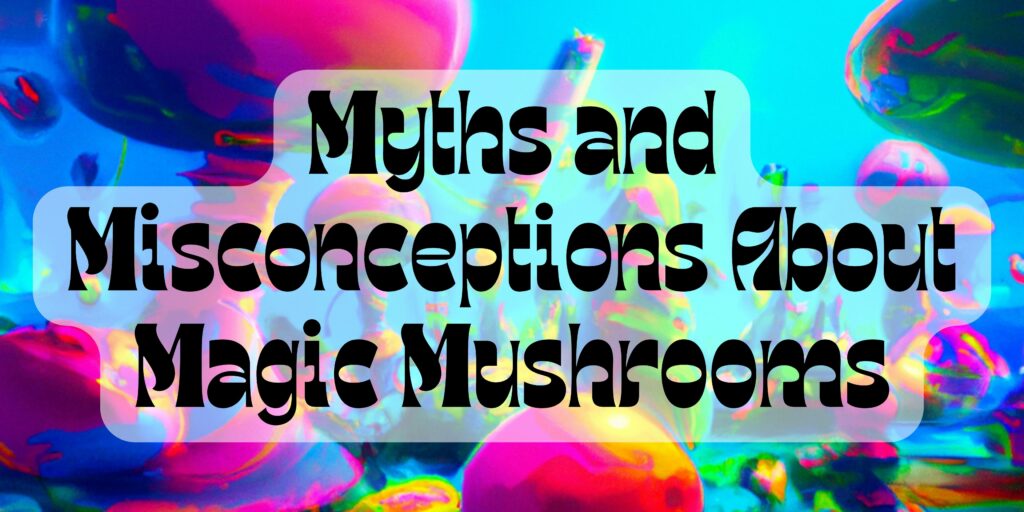Discover the fascinating effects of psychedelics on the brain and the potential they hold for revolutionizing mental health treatment. In this article, we delve into the science behind psilocybin, the active ingredient in magic mushrooms, and its transformative impact on the mind.
Psilocybin has shown promising results in treating treatment-resistant depression, offering hope for those who have not responded to conventional therapies. Ongoing research conducted at institutions like Imperial College London aims to establish psilocybin as a breakthrough treatment for various mental health disorders.
Key Takeaways:
- Psilocybin, the active ingredient in magic mushrooms, has shown promising results in treating treatment-resistant depression.
- Brain imaging studies have revealed that psilocybin reduces blood flow and resting activity in the amygdala, a brain region associated with depression and anxiety.
- Psilocybin promotes new patterns of thinking and behavior by loosening connections between brain networks.
- Psychedelic-assisted therapy combines the use of psilocybin with psychotherapy and shows potential in addressing deep-seated psychological issues.
- Despite its potential therapeutic benefits, psilocybin remains classified as a Schedule I substance, limiting its availability for medical use.
The Power of Psilocybin: How Magic Mushrooms Affect the Brain
Magic mushrooms have long been revered for their mind-altering properties, but it’s only recently that science has begun to uncover the fascinating ways in which psilocybin, the active compound in these mushrooms, affects the brain. Numerous studies have shown that psilocybin has a profound impact on cognition and neuroplasticity, leading to new insights into the potential therapeutic applications of this hallucinogenic compound.
One of the key findings is that psilocybin reduces blood flow and resting activity in the amygdala, a region of the brain commonly associated with depression and anxiety. This helps explain why individuals who receive psilocybin often report a decrease in symptoms of these mental health disorders. Additionally, psilocybin has been found to enhance emotional responses and promote active confrontation of depression, setting it apart from traditional antidepressants.
Psilocybin also loosens connections between different brain networks, allowing for new patterns of thinking and behavior. This increased brain connectivity is believed to contribute to the profound shifts in perception and consciousness experienced during a psychedelic trip. It opens the door to new possibilities for personal growth and self-awareness, providing a unique opportunity for individuals to explore their inner world.
| Effects of Psilocybin on the Brain | Benefits |
|---|---|
| Reduces blood flow and resting activity in the amygdala | Decreased symptoms of depression and anxiety |
| Enhances emotional responses | Active confrontation of depression |
| Loosens connections between brain networks | Promotes new patterns of thinking and behavior |
While the cognitive impact of hallucinogens like psilocybin is still being explored, the growing body of research suggests that these substances have more to offer than just recreational use. The potential therapeutic benefits are immense, with ongoing studies investigating the use of psilocybin for a range of mental health conditions, including depression, anxiety, addiction, and post-traumatic stress disorder (PTSD). The neuroplasticity induced by psilocybin offers a new frontier in mental health treatment, paving the way for innovative approaches to therapy.
The Therapeutic Potential of Psilocybin
Psilocybin, the active ingredient in magic mushrooms, shows promising potential as a therapy for various mental health conditions. Research has revealed its ability to reduce end-of-life depression and anxiety in cancer patients, assist with addiction treatment, and address deep-seated psychological issues when combined with psychotherapy. The neural activity induced by psilocybin during a psychedelic experience is believed to promote new patterns of thinking and behavior, leading to long-term improvements in mental well-being.
Studies have demonstrated that psilocybin can have a transformative effect on individuals struggling with anxiety, addiction, and OCD. For instance, it has been found to reduce depressive symptoms in treatment-resistant depression and enhance emotional responses. Furthermore, it facilitates active confrontation of depression and enhances the capacity for self-reflection and introspection. Such effects make psilocybin a potentially powerful tool in the treatment of mental health disorders.
Although the exact mechanisms of action are not fully understood, psilocybin’s impact on brain activity has been observed through brain imaging studies. These studies have shown decreased activity in the amygdala, a region associated with depression and anxiety, and increased connectivity between various brain networks. This altered neural activity is thought to contribute to the profound shifts in perception and consciousness experienced during a psychedelic trip.
The Therapeutic Potential of Psilocybin – Table
| Condition | Treatment Potential | Evidence |
|---|---|---|
| Anxiety | Potential for reducing anxiety symptoms | Ongoing research, anecdotal reports |
| Addiction | Potential for reducing addiction and dependency | Studies on smoking addiction and alcohol dependency |
| Depression | Potential as a transformative treatment for treatment-resistant depression | Studies on reduction in depressive symptoms |
| OCD | Potential for addressing deep-seated psychological issues | Preliminary studies, ongoing research |
Despite the potential therapeutic benefits of psilocybin, its classification as a Schedule I substance has limited its availability for medical use. However, there is a growing interest in reevaluating its medical potential, and ongoing clinical trials are investigating its safety and efficacy. With continued research and regulatory support, psilocybin could potentially be approved as a licensed medicine within the next few years, offering hope to millions of individuals suffering from mental health disorders.
The Science Behind Psychedelic Experiences
Psilocybin, the active compound found in magic mushrooms, has been known to produce profound and transformative psychedelic experiences. These experiences can vary from person to person but often involve altered states of consciousness, enhanced perception, and a sense of interconnectedness with the world around them.
Research has shown that psilocybin works by binding to serotonin receptors in the brain, leading to changes in neural activity and neurotransmitter release. This ultimately results in the characteristic effects of a psychedelic trip.
During a psychedelic experience, brain imaging studies have revealed intriguing changes in brain function. The amygdala, a region of the brain associated with fear and anxiety, shows reduced blood flow and resting activity. This may explain why individuals often report a sense of calmness and decreased anxiety during a psilocybin trip.
| Brain Functions During a Psychedelic Trip | Effects |
|---|---|
| Increased Connectivity | Psilocybin has been found to increase connectivity between different regions of the brain, allowing for the integration of new information and perspectives. |
| Altered Perception | Psilocybin can lead to changes in sensory perception, such as enhanced colors, patterns, and intensified emotions. |
| Ego Dissolution | Many individuals report a temporary loss of ego or self-identity during a psychedelic experience, leading to a greater sense of connectedness with others and the universe. |
| Neuroplasticity | Psilocybin has been shown to promote neuroplasticity, or the brain’s ability to reorganize and form new connections. This may contribute to the long-lasting therapeutic effects of psychedelics on mental health. |
While the exact mechanisms of psilocybin’s effects on the brain are still not fully understood, ongoing research continues to uncover new insights into the science behind psychedelic experiences. Understanding these mechanisms can help guide future research and potentially lead to the development of more targeted psychedelic therapies.
The Road to Medical Approval
Despite the neurological benefits of magic mushrooms and the potential for transformative psychedelic therapy, psilocybin still faces significant regulatory challenges on its path to medical approval. Currently classified as a Schedule I substance in many countries, including the US and the UK, psilocybin is considered to have a high potential for abuse and no accepted medical use. This classification has limited research on the drug and made it difficult for patients to access its therapeutic potential.
However, the tide is slowly turning. With growing scientific evidence supporting the safety and effectiveness of psilocybin, there is a growing movement to reevaluate its medicinal value. Several clinical trials are currently underway to assess the drug’s efficacy in treating mental health disorders such as depression, anxiety, and PTSD. These studies aim to provide the necessary data to support the approval of psilocybin as a licensed medicine for mental health treatment.
Table: Current Status of Psilocybin Regulation
| Country | Regulatory Status |
|---|---|
| United States | Schedule I substance |
| United Kingdom | Class A drug |
| Canada | Illegal, but Health Canada grants exemptions for medical use |
| Germany | Illegal, but in exceptional cases, medical use is permitted |
| Australia | Illegal, but some states allow medical use under certain conditions |
These regulatory changes would open the door for healthcare professionals to prescribe psilocybin for mental health conditions, providing a new treatment option for patients who have not responded to traditional therapies. As research continues to uncover the potential benefits and safety profile of psilocybin, it is hoped that medical approval will be granted in the near future, offering a glimmer of hope to those suffering from mental health disorders.
Personal Stories of Transformation
When it comes to the neurological benefits of magic mushrooms and the profound impact they can have on mental health, personal stories of transformation provide compelling evidence. Countless individuals have shared their experiences of using psilocybin and the positive effects it has had on their well-being. These stories highlight the potential of magic mushrooms to spark introspection, enhance self-awareness, and promote personal growth.
Many people who have consumed magic mushrooms describe experiencing a deep sense of interconnectedness with others and the world around them. This feeling of unity and connection often leads to a shift in perspective and a greater appreciation for life. By expanding consciousness and inducing altered states of mind, psilocybin can unlock new insights and perspectives that were previously inaccessible.
“Using magic mushrooms was a life-changing experience for me. It allowed me to confront my fears and traumas head-on, leading to profound healing and transformation. I gained a deeper understanding of myself and the world around me, and I now approach life with a greater sense of joy and purpose.” – Sarah*
While personal anecdotes provide valuable insights into the potential of magic mushrooms, it’s important to note that more research is needed to fully understand their therapeutic benefits. Clinical trials and scientific studies are underway to investigate the neurological effects of psilocybin and its potential for treating mental health conditions.

The Power of Personal Stories
Personal stories can serve as a powerful tool to raise awareness and destigmatize psychedelic therapy. By sharing their experiences, individuals who have benefited from magic mushrooms can inspire others to explore alternative treatments for mental health issues.
It’s important to approach personal stories with an open mind and recognize that each individual’s experience is unique. While psilocybin may have transformative effects for some, it may not be suitable or effective for everyone. Professional guidance and a controlled environment are essential for ensuring safe and beneficial experiences with magic mushrooms.
As the field of psychedelic research continues to evolve, personal stories will play a crucial role in shaping public perception and understanding of the therapeutic potential of magic mushrooms.
Table: Personal Stories of Transformation
| Name | Condition | Transformation |
|---|---|---|
| John* | Anxiety | Significant reduction in anxiety symptoms and a newfound sense of calm and clarity |
| Lisa* | Depression | Improved mood, increased motivation, and a shift in perspective leading to enhanced well-being |
| Michael* | PTSD | Reduced frequency and intensity of traumatic flashbacks, improved emotional regulation, and a sense of emotional resolution |
*Names have been changed for privacy.
The Future of Psychedelic Therapy
Psychedelic therapy is on the brink of a breakthrough in the field of mental health treatment. Ongoing research and clinical trials are shedding light on the potential of psychedelics, such as psilocybin, in addressing conditions like depression, anxiety, and PTSD. The remarkable effects of these substances on the brain have sparked hope for a new era of transformative therapies.
Psychedelic-assisted therapy, which combines the use of psychedelics with psychotherapy, has shown promise in providing long-lasting relief from mental health issues. By promoting neural plasticity and altering brain functions during a psychedelic trip, these therapies have the potential to facilitate profound personal growth and healing.
While further research is needed to fully understand the mechanisms of action and long-term effects of psychedelic therapy, the initial findings are encouraging. As the evidence continues to accumulate, the potential for incorporating these therapies into mainstream mental health treatment becomes increasingly evident. The future of psychedelic therapy holds the promise of revolutionizing the way we approach and treat mental health disorders.
| Benefits of Psychedelic Therapy | Challenges and Considerations |
|---|---|
|
|
The Road Ahead: Research and Integration
As psychedelic therapy continues to gain recognition and support, it is crucial to prioritize further research and ensure its safe and responsible integration into clinical practice. This includes establishing comprehensive guidelines for therapy protocols, training therapists in psychedelic-assisted therapy, and addressing legal and regulatory barriers that impede access to these treatments.
Additionally, ongoing research is essential in understanding the full potential and limitations of psychedelic therapy. Exploring different dosing regimens, optimizing therapy protocols, and conducting larger-scale clinical trials will provide valuable insights into the efficacy, safety, and long-term effects of these treatments.
With these efforts in place, the future of psychedelic therapy holds tremendous promise in transforming mental health treatment and offering new avenues of healing for individuals struggling with various mental health conditions.
Conclusion
The study of psychedelic therapy and the neurological benefits of magic mushrooms is shedding light on new possibilities for treating mental health disorders. Clinical trials have shown promising results, indicating that psilocybin, the active ingredient in magic mushrooms, holds transformative potential for conditions such as depression and anxiety.
However, it is important to note that further research is necessary to fully understand the therapeutic potential and long-term effects of psilocybin. Scientific exploration and regulatory support are crucial to ensure the safe and effective use of this substance in treating mental health issues.
With continued dedication and investment in research, and with the support of regulatory authorities, it is possible that psilocybin could become a licensed medicine in the near future. This would bring hope to millions of individuals who currently struggle with mental health disorders, offering them a new avenue for healing and recovery.
FAQ
What is the potential therapeutic benefit of psilocybin?
Psilocybin has shown promising results in treating treatment-resistant depression, anxiety, addiction, OCD, and end-of-life depression and anxiety in cancer patients. It is being explored as a transformative therapy for mental health disorders.
How does psilocybin affect the brain?
Psilocybin reduces blood flow and resting activity in the amygdala, a region of the brain associated with depression and anxiety. It also loosens connections between brain networks, allowing for new patterns of thinking and behavior.
How does psilocybin work differently from traditional antidepressants?
Psilocybin enhances emotional responses and promotes active confrontation of depression, unlike traditional antidepressants that primarily work by regulating serotonin levels in the brain.
What are the mechanisms of action of psilocybin?
Psilocybin is believed to work by binding to serotonin receptors in the brain, leading to altered states of consciousness. During a psychedelic trip, it reduces blood flow and resting activity in the amygdala while promoting increased connectivity between different regions of the brain.
Why is psilocybin still classified as a Schedule I substance?
Psilocybin remains classified as a Schedule I substance in many countries due to its potential for abuse and lack of accepted medical use. However, there is growing interest in reevaluating its medical potential, and clinical trials are underway to assess its safety and efficacy.
Have there been any personal stories of transformation with psilocybin?
Numerous individuals have reported profound transformations in their mental health and overall well-being after using psilocybin. These personal stories highlight its potential to spark introspection, enhance self-awareness, and promote personal growth.
What does the future of psychedelic therapy look like?
Ongoing research aims to further understand the mechanisms of action of psilocybin and explore its potential for treating mental health conditions. Clinical trials are investigating psychedelic-assisted therapy as a treatment for depression, anxiety, and PTSD. Psilocybin could revolutionize mental health treatment if continued research supports its efficacy and safety.




